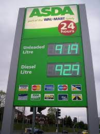We know the problem, one is wind resistance I am limited to 16 MPH, and the other is weight, one is driving around in a vehicle weighing a ton plus, much is down to crash resistance which adds a huge amount of weight, but at least with petrol and diesel we can look up with easy how many miles per gallon, and so work out miles per £. We know the fuel with a massive amount of tax added will cost around £1.40 to £1.60 per litre where ever we fill up, and it will take between 5 to 20 minutes to fill up depending on how many waiting at the pumps.
OK the Ant "25.05 kWh lithium iron phosphate battery pack, 251 km CLTC cruising range" or 6.2 miles per KWh so at £0.30 = £1.86 per mile, but the big problem is it could also cost £3 per kWh if using a fast charger enroute so jumps to £18.6 per mile. All petrol stations have a sign
View attachment 318890 we know how much it will cost, my local EV charging point has nothing to say what it will cost until one down loads the app, and I can't how ever many pounds I have in my pocket buy one single kWh I have to have a bank account to use it.


